UNIT 2: Education and personal development
Key Unit Competence: To Use language learnt in the context ofEducation and Personal development.
Introductory activity: Observe the pictures below and tell whothey show.
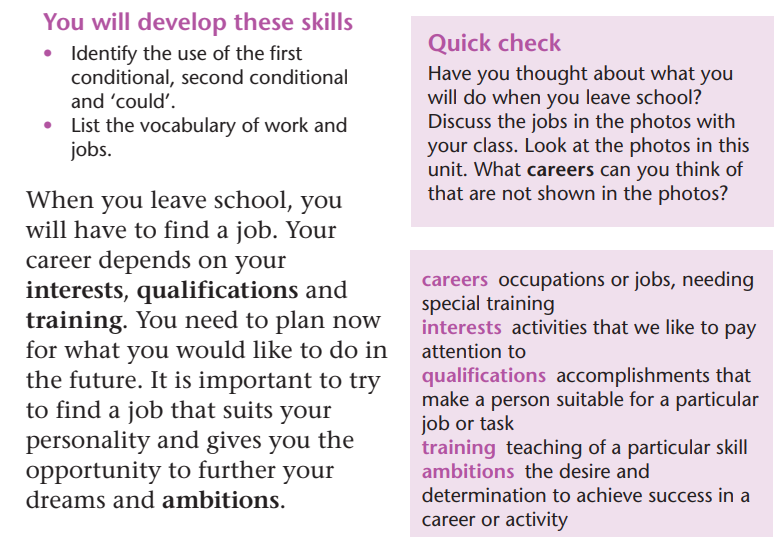
Ability at school and educational ambitions
Before we leave school, we need to decide on a career path.Read about educational ambitions
It is not a coincidence that the subjects we do well in at school are usually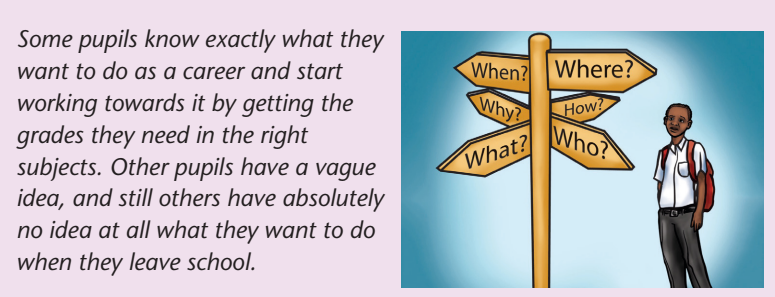
the ones we like best. These are the subjects that are easiest for us to
master and to get good grades in. Sometimes we have to work really hard
at a subject because we know we need to get a good grade in thatsubject to be able to study for our chosen career.
It is important to make plans for the future while you are still at school. Ifyou do not make plans, you will have no direction.
Activity 1: What are your favourite subjects?
In pairs, talk about your favourite school subjects. Your conversation will gosomething like this.
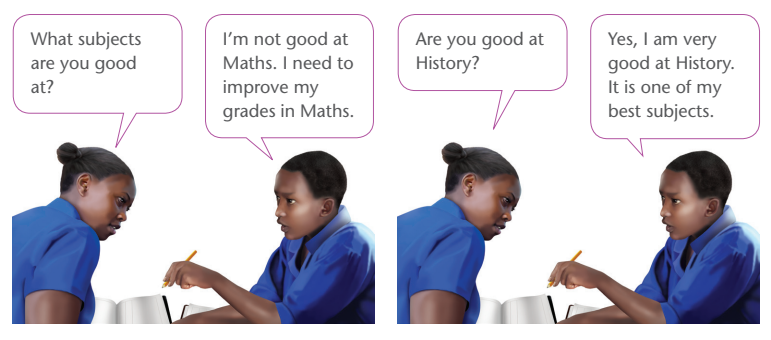
Read about skills and talents
The following table shows the subjects needed for different career fields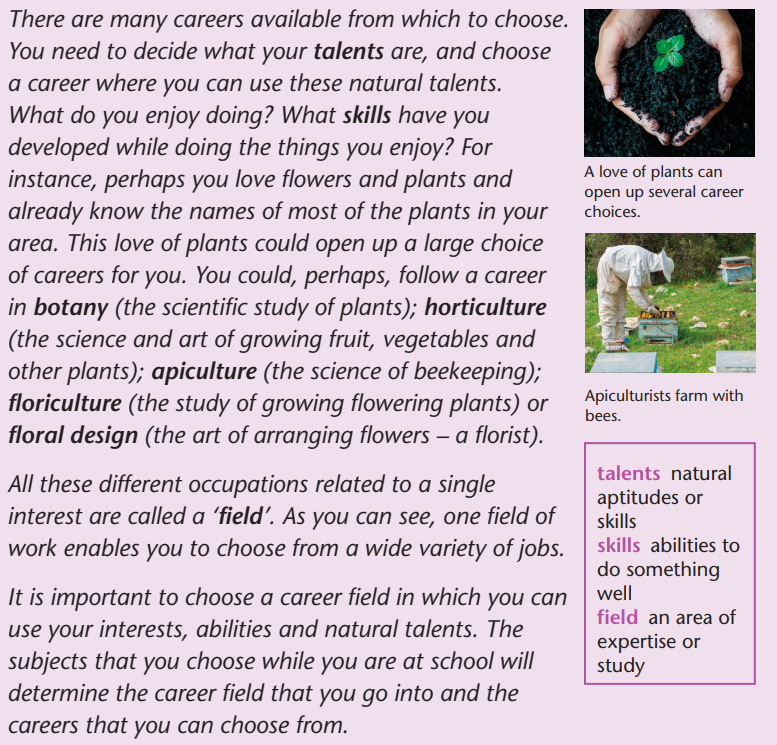
and some of the careers available within each career field.

Activity 2: Compare your subjects and career fields
In which subjects do you perform best? Which subjects do you enjoy the most?
Make a list of these subjects and then compare your subjects to those in thetable above to see which field you might consider going into.
Grammar focus
The first conditional with ‘if’
Conditional sentences are used to speculate about what could happen. They
are used to refer to a possible condition and its probable result in the present or
future where the situation is real. For example: If it rains today, you will get wet.
The ‘if’ clause (if it rains today) is in the simple present tense, and the main
clause (you will get wet) is in the simple future tense.
First conditional sentences are based on facts. Most conditional sentences
contain the word ‘if’. We do not normally use ‘will’ or ‘would’ in the conditional
clause, only in the main clause.
Examples:
• If you help me with the dishes, I will help you with your homework.• If I have enough money, I will go to Kigali.
Activity 3: Write conditional sentences
Complete the following first conditional sentences.
1. If you work hard, you will ______.
2. If you invite her, she will ______.
3. If I am late, I will ______.
4. If I win first prize, I will ______.5. If you need me, you can ______.
Read a conversation about leaving school
Listen to the following conversation among three Standard 4
pupils at Green Hills Academy. Three pupils can each read a partof the dialogue.
Keza: My teacher says that I must start thinking about what I want to do
when I leave school. I’d like to become a doctor. If I get good
grades, I will go to university. What jobs are you interested in
doing, Mihigo?
Mihigo: I like writing, so I’d like to work as a journalist.
Ngabo: That sounds interesting. If you go to university, what will you
study?
Mihigo: I will have to study English and Journalism and then try to get a
junior job with a local newspaper. It is difficult to get a job as a
journalist. What about you, Ngabo? What would you like to do
professionally?
Ngabo: I would like to get experience in banking. If I go to university, I will
study finance.
Keza: If you want to study finance, you will have to get good marks in
Mathematics. It sounds like we all have to work very hard to get theright grades we need!
Activity 4: Describe your ambitions
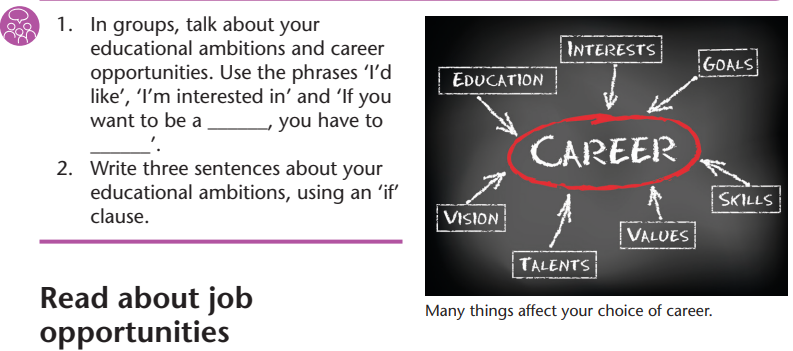
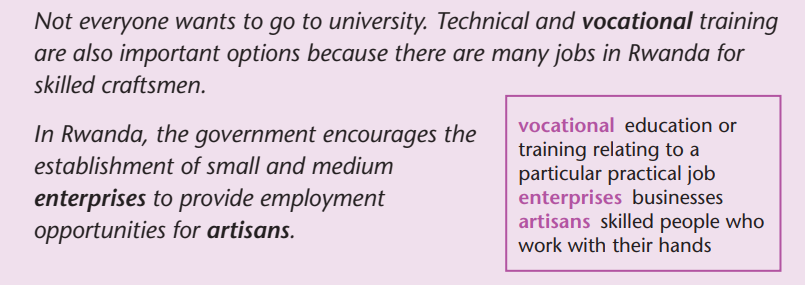
The following case study is an example of a young woman who made asuccessful career out of handcrafts.
Activity 5: Write about technical skills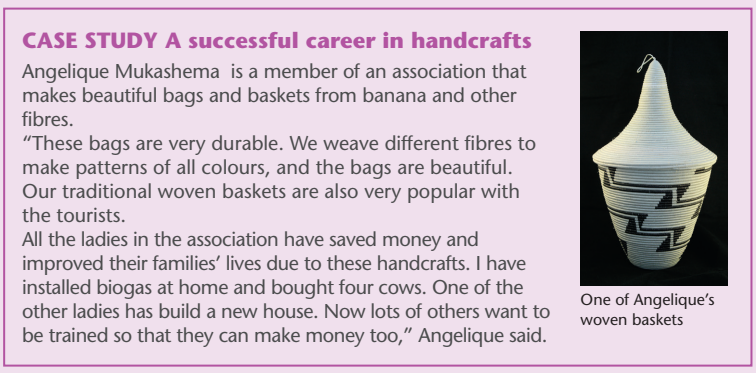
Write sentences about technical skills, using the sentence: If you learn ______ ,
you will ______ . For example: If you learn plumbing, you will be able to fixleaky sinks.
Read about salaries
When you are deciding on a career, you will also have to consider what
you could expect to earn in a particular career. In general, the longer you
study, the higher your salary will be. This is because you will have gainedmore knowledge and learned more skills.
The following table shows some average salaries earned per annum indifferent occupations, as well as the level of education required.
Activity 6: Do research about careers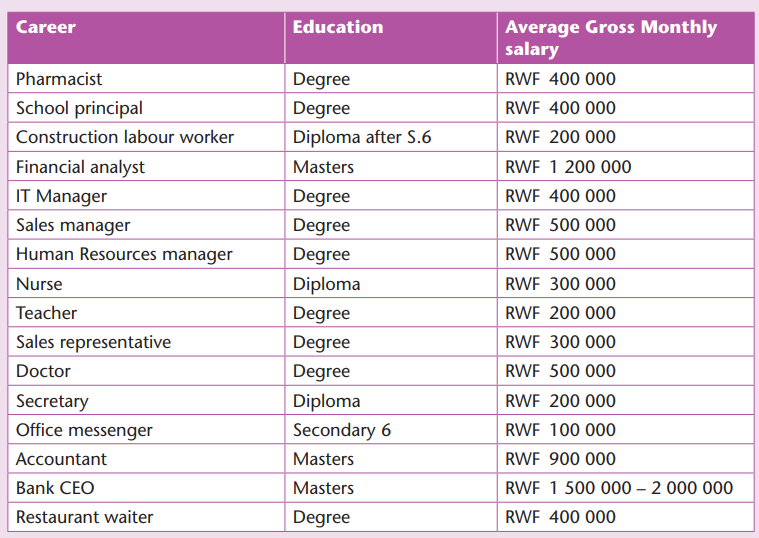
1. Research and find out what people earn in the following occupations:
• teacher • farmer
• shop assistant • dentist.
2. Make a table similar to the one above and fill it in with your findings.3. Discuss different career options with your class.
Read a conversation about education
Read this conversation between a doctor (Dr George), a lawyer
(Joan) and a teacher (Clever).
Dr George: Hello, Joan. Clever, meet Joan. Joan is the best lawyer we have in
town. Joan, this is Clever, he is a teacher at Leafy Wood Academy.
Joan: Nice to meet you, Clever. What do you teach?
Clever: I teach Physics and Mathematics.
Dr George: Clever has been reminding me of our school days. He says that the
education system has changed quite a bit since our school days.
Joan: Oh really? I don’t see any changes in the system. The country is still
producing the same types of professionals: teachers, lawyers,doctors, engineers, nurses, counsellors … Mind you, there are a few
new professions that have developed in recent times.
Clever: You mean information technologies? Good observation, Joan! I
must tell you, teaching these new technologies is demanding; it has
taken over much of the time that we used to use for informal
activities. Do you remember how we used to have time for a lot of
handwork, cultural activities and a wide range of sports and art? We
now have very limited time for these activities.
Joan: Yes, of course I remember. At my school, we used to spend a lot of
time knitting, having lessons in home management and also doing
sports, music, dance and drama. You know what, if it were not for
my parents’ insistence, I would be a chef right now. I was very
much in love with the kitchen and catering.
Dr George: You don’t say! Do you regret having taken a different career path?
However much I loved football, I never thought of taking it to a
professional level. It just helped me to keep active and healthy. You
cannot excel at school if you do not have a clear mind.
Joan: Come on, George, I do not regret anything. I love the courtroom,
and I also enjoy compiling all the evidence needed to win a case.
Now, Clever, tell me – I hear that the arts are being neglected. Is
this true? If so, how are you going to produce more professionals?
Clever: That is not correct. Art subjects have not been neglected, but with
the increase in technology, we need to equip the youth with more
practical skills. Besides, there have been high rates of
unemployment all over the world, and teaching technical and
entrepreneurship skills will help to create more job creators.
Dr George: I completely agree with that. Our children need a great many
technical and vocational skills in the competitive society of today.
Clever: Well, I have to go now. You both know that teachers have to be
very time-conscious because of our busy schedules.
Dr George: Not very different from a doctor. I have an appointment with a
patient in about an hour’s time. We can leave together. I will give
you a ride.Joan: Do not mind me. I have a free afternoon. I am going to the museum.
Activity 7: Answer comprehension questions
1. What are extra activities in schools?
2. Why do you think these activities are referred to as ‘informal’ in the
conversation?
3. What has caused limited time for informal activities in schools?
4. Why do you think Joan is not a chef right now?
5. What academic subjects do you think Joan liked during her school days?
6. Who are job creators? What skills do you need to be a job creator?
7. Among the three, who is going to be resting after their departure?
8. Explain what Clever means when he says, “Teachers have to be very timeconscious”.
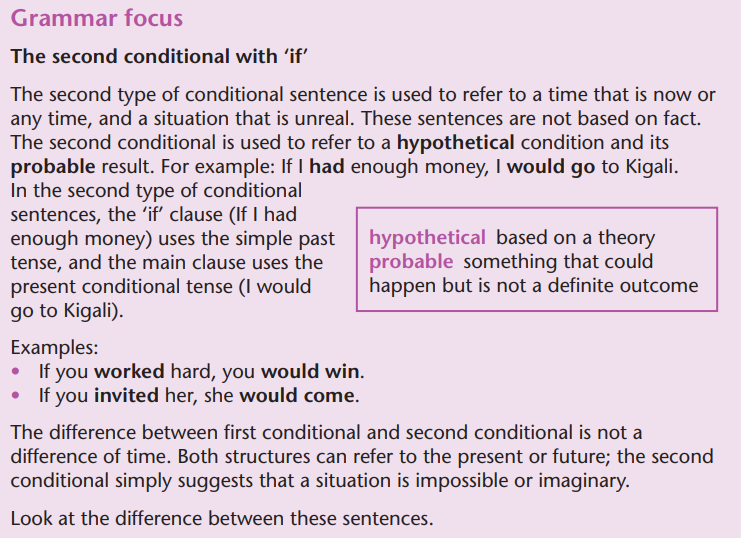
Activity 8: Practise using the second conditional with ‘if’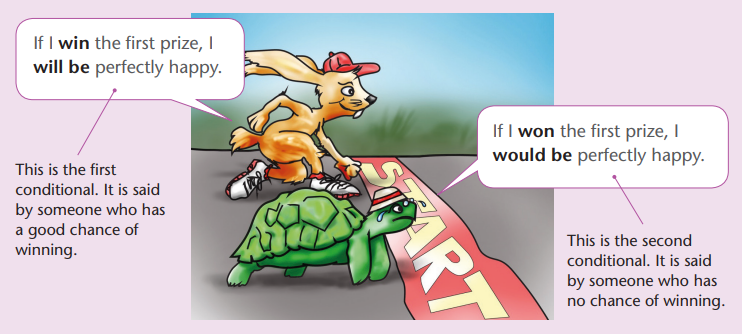
Complete the following sentences.
1. If I got a pay rise, ______ .
2. If you left your job, ______ .
3. If you were nicer to him, ______ .
4. If we had gone out earlier, ______ .5. If I had revised, ______ .
Applying for jobs
Read about job advertisements
One way of looking for a job is to read job advertisements. These can be
found in newspapers and on the Internet. When you read a job
advertisement, you will see that it has two parts to it: the jobdescription and the job specification.

The job description refers to the content of the job itself and sets out the
duties and responsibilities required of the person employed to do the job.
It specifies:
• the title of the job
• the location of the job• the duties of the job.

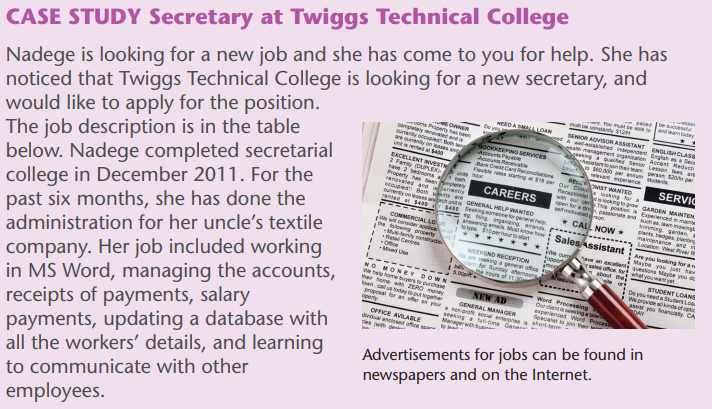
Activity 9: Work with job advertisements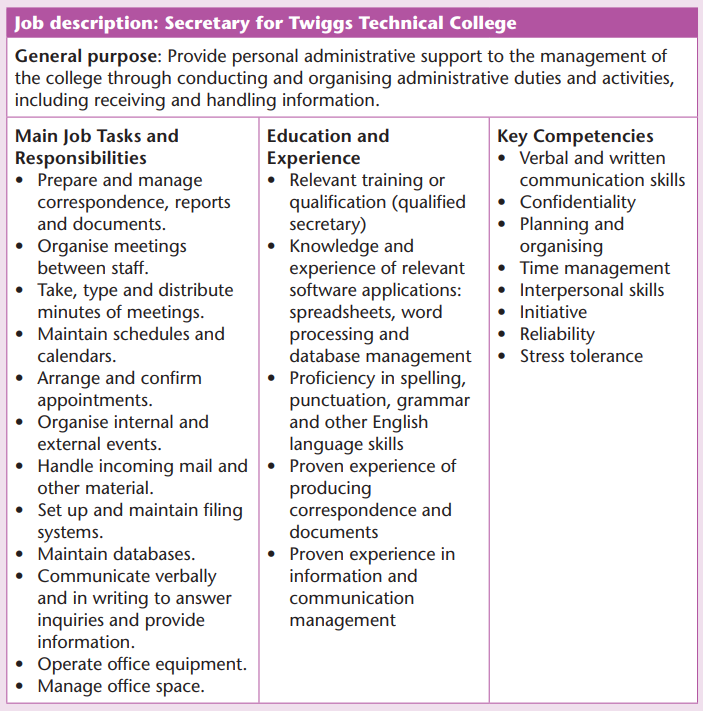
1. In your group, discuss whether Nadege is suitably qualified for the job and
advise her as to whether or not she should apply.
2. Write an advertisement for a new teacher at your school. Your advertisementshould include both a job description and a job specification.
Lifelong learning and career development
Read about personal development
Modern technology helps you to do your job more efficiently, so make sure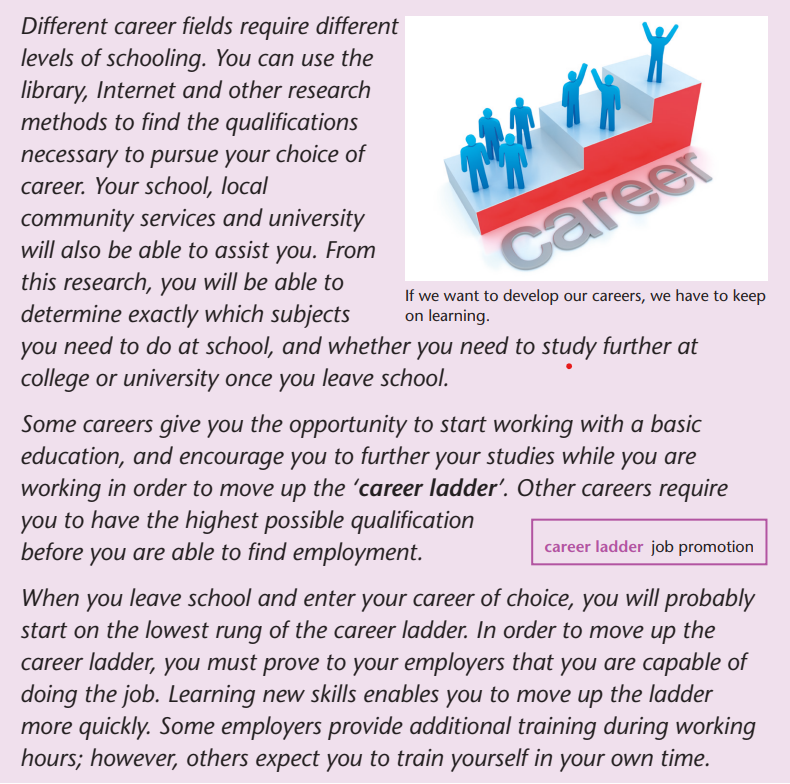
you have the proper skills to use this technology. Often, your boss or your
co-workers will show you how to use this equipment.
If you become involved in different tasks, you will start to understand
what the company you work for is trying to achieve. You will also
enhance your efficiency and abilities, and increase your confidence and
self-esteem. With each new aspect of the job, you will learn new skills and
all these skills will help you to move up the career ladder. Opportunities
often arise in the workplace where you can exhibit your skills and talents,and you can then move into a totally different branch of your career.
Vocabulary, pronunciation and spelling
Activity 10: Match words and their meanings
Use your dictionary to look up the words in the left-hand column of the table,
and then match them to the correct description in the right-hand column. Makesure that you can pronounce the words correctly.
Writing and understanding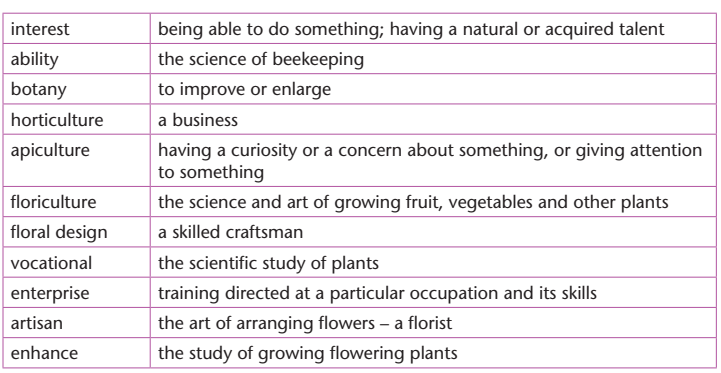
To write a Report is to give information about something you
have heard, seen, done or plan to do, etc. So, the writer exposes
or explains facts in an organized way to make his readers live with
the circumstances.
Example: A football coach, a businessman, a school master canwrite a report about his activity.
Activity 11: Write a report
Write a report about your ambitions and how you plan to further your education.
Jobs and gender
In many countries, women still do not have the same job and pay
opportunities as men. In Rwanda, gender equality is written into
the Constitution; Article 11 of the Constitution states that all
Rwandans are equal regardless of gender, race or religion. In the
past, many women only held jobs at the level of receptionists and
personal assistants but this is changing rapidly, although womenstill find it difficult to access finance to start their own business.
In Rwanda, the government has made a commitment to
promoting gender equality. According to the 2009 Social Watch
Gender Equity Index, Rwanda was equal second in the world in its
efforts towards gender equality. Only Sweden had a higher score.
Rwanda was the first country in the world to have more than 50%
female members of parliament. The government has set a target
for women to make up 40% of all those in decision-makingpositions by 2020.
These goals are in line with the United Nation’s third Millennium
Development Goal, the promotion of gender equality. This covers
many aspects that affect women’s lives, from access to education,
to accessing finance, to participation in decision-makingprocesses, to reducing gender-based violence.
Activity 12: Discuss women’s roles in Rwanda
In your group, find answers to the following questions.
1. What are the United Nations’ eight Millennium Development Goals?
2. Discuss the business world in your district. How many women entrepreneurs
can you think of?3. In a traditional society, what are the roles of women?
Assessment
1. Complete the following sentences, using the correct modal verb.
a) If I get home late tonight, I ______ not eat.
b) If Jan could run 100 metres in 10 seconds, he ______
be an athlete.
c) If Simon catches a fish today, we ______ eat it.
d) She ______ buy a new car if she won the lottery.
e) If it rained in the Sahara Desert, everyone ______ be
very surprised.
f) If it rains tonight, we ______ go to the cinema.
g) If your dog spoke, you ______ sell it to the circus.
h) If we play football on Saturday, I ______ be tired on Sunday.
i) You ______ become fat if you eat too much.
j) If I ______ you, I wouldn’t accept that job. It sounds
terrible!
(10 marks)
2. Explain briefly why some jobs command higher salaries
than others.
(5 marks)
3. Analyse your talents and describe what careers you
believe would suit you. (5 marks)Total (20)
